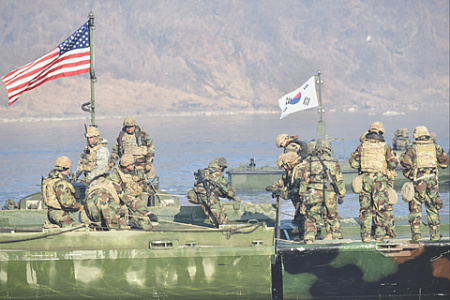
South Korea’s President Lee Jae-myung is navigating a perilous diplomatic landscape, underscored by the recent launch of joint military exercises with the United States. The drills, designed to deter aggression from North Korea, place the South Korean leader in a precarious position: he must pursue a policy of reconciliation with a hostile Pyongyang that rejects all overtures, while simultaneously maintaining a critical military alliance with Washington, an ally whose drills are a major source of tension with the North.
The biannual exercises, dubbed ‘Ulchi Freedom Shield’ in honor of a 7th-century general who repelled a Chinese invasion, serve to bolster South Korea’s defense capabilities against potential threats from its northern neighbor. The current 11-day operation involves approximately 18,000 South Korean and 3,000 U.S. personnel, a significant deployment from the roughly 28,500 American troops stationed permanently on the peninsula. While U.S. officials state the scale is comparable to last year’s, nearly half of the planned field exercises have been postponed in a nod to Seoul’s ongoing diplomatic efforts with Pyongyang.
Since taking office, President Lee has initiated a dramatic policy shift toward North Korea, signaling a clear intention to seek reconciliation. In a tangible move, his administration halted propaganda broadcasts across the border, which included K-pop music and criticism of the North Korean regime, and later ordered the loudspeakers to be dismantled. President Lee has also directed his government to prepare for the implementation of past inter-Korean agreements, likely referencing pacts from 2007 and 2018 aimed at economic cooperation and establishing a permanent peace with a commitment to denuclearization.
Despite these gestures of goodwill, Pyongyang remains staunchly opposed to engagement. Kim Yo Jong, the influential sister of the North Korean leader, has repeatedly dismissed the prospect of talks, asserting that President Lee’s administration is no different from its more hardline predecessor. The continuation of the joint U.S. military drills has drawn sharp condemnation from the North, with its defense minister warning that its armed forces are prepared to counter any provocation. This deep-seated distrust presents a formidable barrier to President Lee’s peace initiatives.
Ultimately, President Lee faces the monumental challenge of building trust with Pyongyang without eroding the security alliance with Washington. The situation is further complicated by concerns in Seoul that the U.S. administration under Donald Trump may soon demand increased financial contributions for maintaining its military presence, a key guarantor of South Korea’s security. Any gesture toward the U.S. is viewed by Pyongyang as a sign of insincerity, while any concession to the North risks antagonizing a vital ally. The success of President Lee’s delicate balancing act remains profoundly uncertain.
